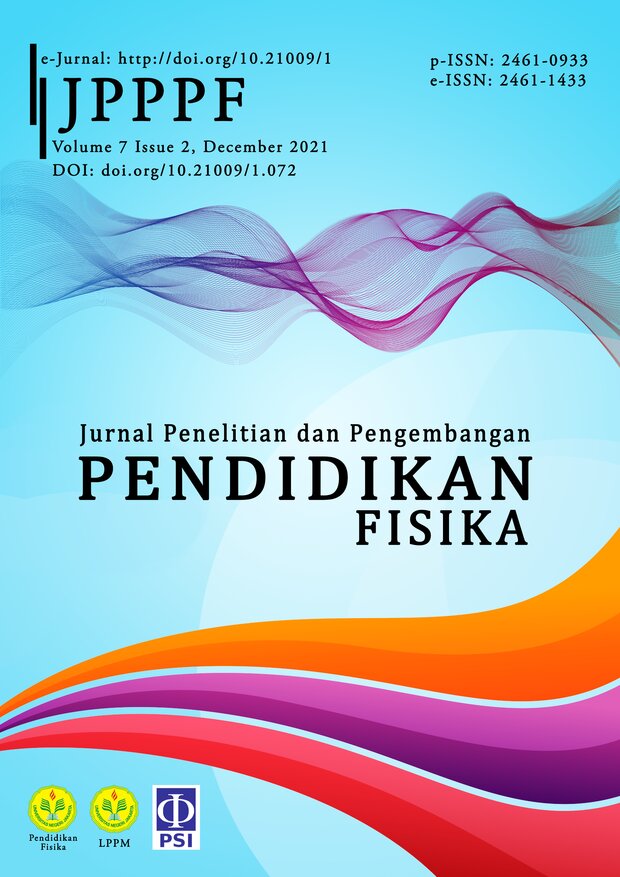Evaluation of the use of the Moodle Platform for Fundamental Physics Lectures at University
DOI:
https://doi.org/10.21009/1.07209Keywords:
e-learning, evaluation, moodle, fundamental physicsAbstract
Almost all countries in the world use E-Learning as a teaching medium. Moodle is a Learning Management System (LMS), a free, open-source platform designed to assist educators in creating online courses with dynamic interaction opportunities. In this study, an evaluation of the use of Moodle was carried out, especially in fundamental physics courses (Newton's Law). Evaluation is given by distributing online questionnaires using Google Forms as a database to store answers, collect feedback, and as statistical software to provide analysis of the effect of using Moodle according to students' opinions or perspectives. The study results show that students experience problems in taking tests/quizzes using SEB due to the instability of the internet signal. One of the reasons is that students also have to join the exam zoom simultaneously. Meanwhile, the Newton's Law material provided is very contextual and rich in sample questions, including providing student feedback which is considered good.
References
Anderson, T 2008, ‘The Theory and Practice of Online Learning, 2nd ed. Athabasca’, Canada: Athabasca University Press.
Bahsh, RE & Daoud, MI 2016, ‘Evaluating the use of moodle to achieve effective and interactive learning: A case study at the German Jordanian University’, Proc. the 2nd International Conference on Open Source Software Computing (OSSCOM 2016).
Bradford, DN, Wilechansky, RM, Pipilas, AR 2021, ‘Revamping Residency Education during a Pandemic with Twitter-Based Learning’, Med.Sci.Educ. vol. 31, pp. 303-304.
Clark, RC & Mayer, RE 2011, ‘E-Learning and the Science of Instruction: Proven Guidelines for Consumers and Designers of Multimedia Learning’, 3rd ed. Santa Ana, CA, USA: Pfeiffer.
Deepak, KC 2017, ‘Evaluation of moodle features at Kajaani University of Applied Sciences – case study’, Procedia Computer Science, vol. 116, pp. 121-128.
Halbherr, T, Reuter, K, Schneider, D, Schlienger, C & Piendl, T 2014, ‘Making Examinations More Valid, Meaningful And Motivating: The Online Exams Service At Eth Zurich’, June 2014.
Halim, A, Soewarno, S, Elmi, E, Zainuddin, Z, Huda, I & Irwandi, I 2020, ‘The Impact of the E-Learning Module on Remediation of Misconceptions in Modern Physics Courses’, Jurnal Penelitian & Pengembangan Pendidikan Fisika, vol. 6, no.2, pp. 203-216.
Ivanović, M, Putnik, Z, Komlenov, Z, Welzer, T, Hölbl, M & Schweighofer, T 2013, ‘Usability and privacy aspects of moodle: Students’ and teachers’ perspective’, Informatica, vol. 37, no. 3, pp. 221-230.
Kato, T, Kambayashi, Y & Kodama, Y 2016, ‘Practice for self-regulatory learning using google forms: Report and perspectives’, nformation Engineering Express International Institute of Applied Informatics, vol. 2, no. 4, pp. 11–20.
Masrifah, M, Setiawan, A, Sinaga, P & Setiawan, W 2020, ‘An Investigation of Physics Teachers’ Multiple Representation Ability on Newton’s Law Concept’, Jurnal Penelitian & Pengembangan Pendidikan Fisika, vol. 6, no. 1, pp. 105-112.
Miller, FP, Vandome, AF & McBrewster, J (Hrsg.) 2010, ‘Kiosk Software’, Saarbrücken: VDM.
Nagy, T 2016, ‘Using learning management systems in business and economics studies in Hungarian higher education’, Education and Information Technologies, vol. 21, no. 4, pp. 897-917.
Nordmann, E, Horlin, C, Hutchison, J, Murray, JA, Robson, L, Seery, MK, & MacKay, JR 2020, ‘Ten simple rules for supporting a temporary online pivot in higher education’, PLoS Computational Biology, vol. 16, no. 10.
Rapanta, C, Botturi, L, Goodyear, P, Guàrdia, L, & Koole, M 2021, ‘Balancing Technology, Pedagogy and the New Normal: Post-pandemic Challenges for Higher Education’, Postdigit Sci Educ, vol. 3, pp. 715-742.
Rasool, JA & Dawood, SS 2021, ‘Evaluate the Use of Moodle Platforms for Education inUniversity of Duhok Using Online Survey Application’, International Journal of Machine Learning and Computing, vol. 11, no. 2.
Rasool, JA 2018, ‘Analysis the relationship between social media and education system in Kurdistan region of Iraq using Chi-Square test,’ Academic Journal of Nawroz University, vol. 7, no. 4, pp. 133-138.
Rodríguez-Triana, MJ, Prieto, LP, Ley, T, de Jong, T & Gillet, D 2020, ‘Social practices in teacher knowledge creation and innovation adoption: A large-scale study in an online instructional design community for inquiry learning’, International Journal of Computer-Supported Collaborative Learning, vol. 15, no. 4, pp. 445-467.
Schneider, DR, Bauer, D, Volk, B, Lehre, M, Piendl, T 2012, ‘The Safe Exam Browser: Innovative Open Source Software for Online Examinations’, 18th International Conference on Technology Supported Learning & Training.
Shahzad, A, Hafizi, W, & Golamdin, AG 2014, ‘E-learning navigation model based on students learning behavior: Case study in UUM’, Int. J. Bus. Soc. Sci., vol. 5, no. 5, pp. 118-130.











